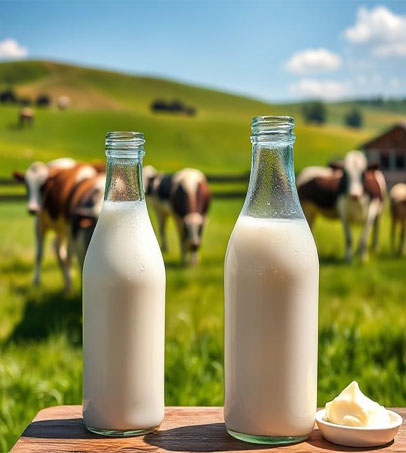Types of Cow Milk
Grass-fed vs. Feed-based Cow Milk
Grass-fed cow milk comes from cows that primarily graze on pastureland, resulting in milk that may have higher levels of omega-3 fatty acids and certain antioxidants. Feed-based milk comes from cows that are fed formulated diets, often in confined settings. The diet influences the flavor, composition, and nutritional profile of the milk, with grass-fed milk often considered more natural and wholesome.
Nutritional Benefits of Cow Milk
- Calcium: Essential for strong bones and teeth.
- Protein: Supports muscle growth and repair.
- Vitamins: Rich in Vitamin D, B12, and other essential nutrients.
- Other nutrients: Contains potassium, phosphorus, and healthy fats.
Cow milk is a convenient source of vital nutrients that contribute to overall health, including bone strength, immune function, and energy levels. For those unable to consume dairy, plant-based alternatives like oat milk can provide similar benefits.
Environmental Impact of Cow Milk Production
Producing cow milk has significant environmental considerations, including water use, greenhouse gas emissions, and land requirements. Sustainable farming practices aim to reduce these impacts, but conventional dairy farming can contribute to environmental challenges. Choosing dairy from local, sustainable sources or plant-based alternatives can help mitigate these effects.
Conclusion
Understanding the types, benefits, and environmental impacts of cow milk empowers consumers to make informed choices aligned with their health and ethical values. Whether you prefer traditional cow milk or plant-based alternatives, knowledge is key to a balanced and sustainable diet.
